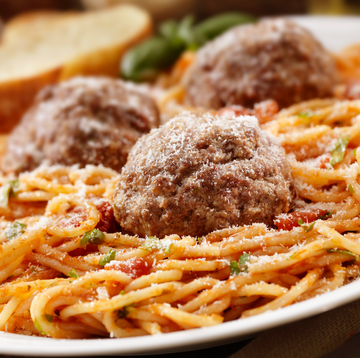When everything is flowing smoothly, life is good. And we're not just talking good hair days or a flawless presentation at work. Your digestive tract counts too. But when it's out of whack, it could affect — you guessed it — the scale.
"Gastrointestinal and digestive issues can definitely have a large effect on the way we eat and how our bodies absorb and digest foods, causing us to gain or lose weight," says Kenneth Brown, M.D., a board-certified gastroenterologist. "Most digestive problems tend to cause weight loss from poor absorption of food, but there are a few situations in which our intestinal health can contribute to weight gain."
If the number on the scale is changing and you really aren't sure why, one of these common digestive issues could be the culprit.
1. Acid reflux disease
Also known as gastroesophageal reflux disease (GERD), this causes a painful burning sensation, or heartburn, in the lower chest when stomach acid rises back up into your oesophagus. And for people who suffer from it, the term "comfort food" takes on a whole new meaning because the act of eating can actually help reduce pain. "Eating provides temporary relief because both the food you're eating, and the saliva from actually chewing that food, neutralises acid," explains Brown. The only problem? Once the food's been digested, all the symptoms — bloating, nausea, and hiccups that won't disappear — tend to come back, and they're usually more aggressive because of rebound acid production. But because people want help, Brown says it's easy to get sucked into a dangerous cycle of overeating that leads to weight gain.
2. Ulcers
These uncomfortable sores — also known as duodenal ulcers — usually develop in the lining of the stomach or small intestine, and it's usually because of too much acid production. And just like with GERD, eating food can improve the painful symptoms — including bloat and constant nausea — because it temporarily coats the ulcer with a protective lining and neutralises the stomach acid, explains Su Sachar, M.D., a board-certified gastroenterologist who specialises in bariatrics, wellness, and optimal health. And, to re-state the obvious, if you're eating more frequently, those excess calories can lead to weight gain.
3. Constipation
When you're stopped up, that weighed-down feeling you get could be weight gain. But there's good news: your body isn't actually absorbing more calories, says Brown, so it's not true weight gain so much as it is extra fecal matter, which is what could be adding a few pounds to the scale. Not to mention that constipation itself doesn't exactly give us the motivation to hit the gym and crush a workout. Rather, it's way more likely that you're feeling sluggish and heavy… and the couch is calling your name.
4. Bacteria overgrowth
Bear with us — this one isn't quite as gross as it sounds. Basically, your bowel contains both good and bad bacteria, and research shows that the good kind plays a crucial role in your overall health by reducing inflammation and keeping your weight in check. The problem occurs when the amount of bacteria increases, or when the type of bacteria gets thrown off-balance. (For optimal health, it's best to think of it like a seesaw — best when the good and bad is totally balanced.) When that happens, what's known as small intestinal bacterial overgrowth (SIBO) can occur, and it can cause weight gain in two ways, says Brown.
First, the bacteria could produce methane gas, which "slows down the overall function of the small intestine, allowing the intestinal villi — small, finger-like projections in the lining of your intestine — to absorb more calories per bite," he explains. In other words, the exact opposite of what you want to happen. Second, SIBO can slow down metabolism and affect your insulin and leptin resistance, both of which help regulate hunger and satiety. As a result, you're likely to crave carbs and probably won't feel full after eating, even if it's a fully satisfying meal, says Sachar.
5. Irritable Bowel Syndrome (IBS)
The term IBS gets tossed around a lot these days, as "it's the most commonly diagnosed GI condition, and it often overlaps with other digestive problems like food sensitivities, a leaky gut, and an imbalance of good and bad bacteria," says Sachar. And like constipation (a symptom of IBS), it can cause bloat and chronic inflammation, which, once again, could lead to weight gain.
6. Crohn's disease
While a smaller appetite and excessive weight loss are common symptoms of Crohn's disease — an incurable chronic inflammatory conditions — the exact opposite can happen as soon as someone gets put on a treatment that involves steroids, which is usually the first step in trying to find a medication that works for you, says Sachar.
"Steroids tend to increase your cravings for carbs and cause you to hold on to more water and feel bloated," says Sachar.
Fortunately, it's usually not too tough to lose the weight once you're off steroids. That usually happens as soon as a flare-up — or the reappearance of symptoms like diarrhoea, constipation, rectal bleeding, and fever — subside and symptoms are better under control.
7. Gastroparesis
Often associated with those who have type 1 or type 2 diabetes, gastroparesis — also known as delayed gastric emptying — is a disorder that "slows or stops the movement of food from the stomach to the small intestine," according to the National Institute of Diabetes and Digestive and Kidney Diseases. Because normal digestion isn't able to occur, it's common to feel like you're gaining weight due to fullness and bloating in the stomach area, but the disorder most commonly leads to weight loss in the end.
8. Food intolerance
If you've noticed your body is easily irritated by certain foods, there's a good chance you have a food intolerance. Different from a food allergy, which is an immune system response, food intolerance affects the digestive system, making it hard to digest and break down certain foods (the most common being dairy), says the Cleveland Clinic. Those with a food intolerance often experience gas, cramps, and bloating, making it feel like they're gaining weight. Depending on how severe the food intolerance is, they might also experience diarrhoea.
9. Ulcerative colitis
Although Crohn's disease can pop up anywhere between the mouth and the anus, UCLA Health says ulcerative colitis stays in the colon, resulting in a constantly inflamed digestive tract that can initially lead to weight loss. Like Crohn's, though, the treatment for the inflammatory bowel disease — steroids — could make your body gain weight.
"An oral steroid like Prednisone can also cause your body fat to redistribute itself, so instead of it being in your stomach or glutes, it could move to the face or neck," says Sachar.
Even though you may notice a difference in your weight during treatment, everything should go back down to normal as soon as you're able to get off the steroids.














